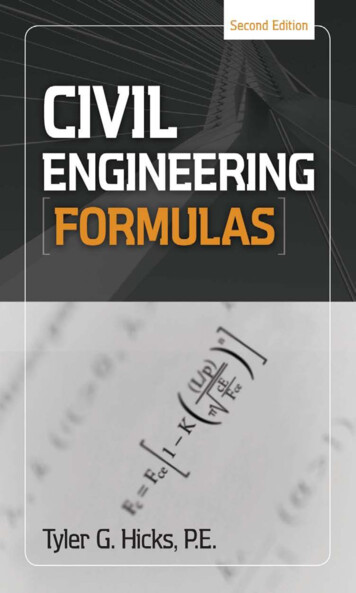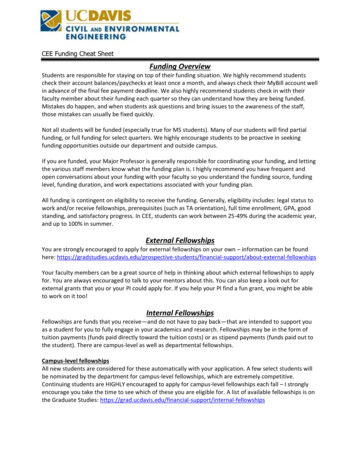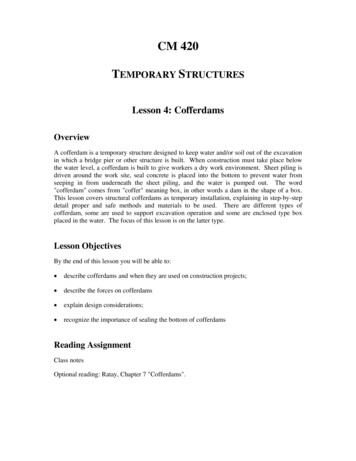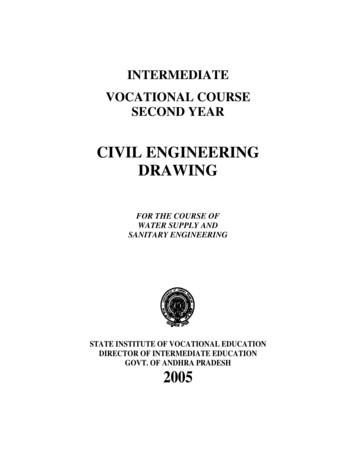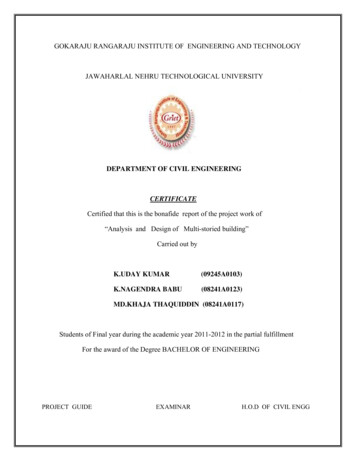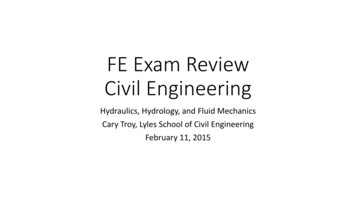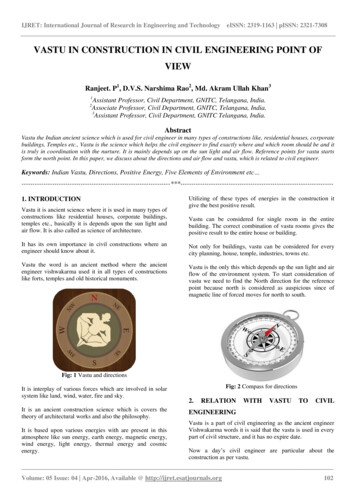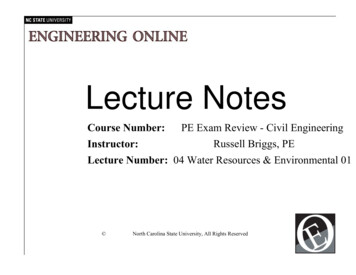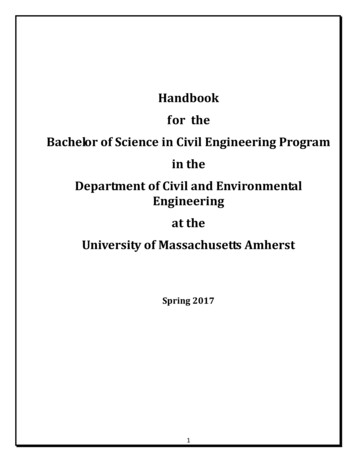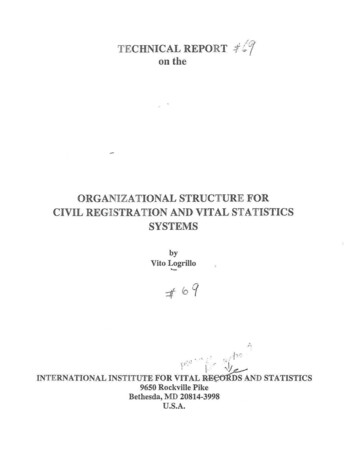
Transcription
CEE - Civil and Environ EngineeringCEE - CIVIL AND ENVIRONENGINEERINGCEE Class Schedule AULT/CEE/)CoursesCEE 190 Project-Based Introduction to CEE credit: 4 Hours. 90/)Allows freshmen to explore topics in Civil and Environmental Engineeringthrough a project-based learning format. The course also developscompetencies in critical skills such as technical writing in CEE, datamanagement and computation, and design thinking in a collaborativeteam environment. Credit is not given for both CEE 190 and CEE 195.CEE 198 Special Topics credit: 1 to 4 Hours. 98/)Subject offerings of new and developing areas of knowledge in civil andenvironmental engineering intended to augment the existing curriculum.Approved for Letter and S/U grading. May be repeated up to 6 hours inthe same semester and to a maximum of 9 hours in separate semesters,if topics vary. See Class Schedule or departmental course information fortopics and prerequisites.CEE 199 Undergraduate Open Seminar credit: 1 to 5 Hours. 99/)May be repeated.CEE 201 Systems Engrg & Economics credit: 3 Hours. 01/)Introduction to the formulation and solution of civil engineeringproblems. Major topics: engineering economy, mathematical modeling,and optimization. Application of techniques, including classicaloptimization, linear and nonlinear programming, network theory, criticalpath methods, simulation, decision theory, and dynamic programmingto a variety of civil engineering problems. Credit is not given for bothCEE 201 and IE 310. Prerequisite: MATH 231; CS 101; credit or concurrentregistration in MATH 225 or MATH 415 or MATH 257.CEE 202 Engineering Risk & Uncertainty credit: 3 Hours. 02/)Identification and modeling of non-deterministic problems in civilengineering design and decision making. Development of stochasticconcepts and simulation models, and their relevance to real design anddecision problems in various areas of civil engineering. Credit is notgiven for both CEE 202 and IE 300. Prerequisite: Credit or concurrentregistration in MATH 241.CEE 300 Behavior of Materials credit: 4 Hours. 00/)Macroscopic mechanical behavior in terms of phenomena at thenanometer and micrometer levels for the three types of engineeringmaterials (metals, ceramics, and polymers) with emphasis on specificmaterials used in civil engineering -- steel, rocks, clay, portland cementconcrete, asphaltic concrete, and wood. Same as TAM 324. Credit isnot given for both CEE 300 and either ME 330 or MSE 280. Prerequisite:Completion of Composition I general education requirement; CHEM 104;TAM 251.This course satisfies the General Education Criteria for:Advanced Composition1CEE 310 Transportation Engineering credit: 3 Hours. 10/)Design, planning, operation, management, and maintenance oftransportation systems; integrated multi-modal transportation systems(highways, air, rail, etc.); layout of highways, airports, and railroads withtraffic flow models, capacity analysis, and safety. Design of facilities andsystems with life cycle costing procedures and criteria for optimization.Prerequisite: TAM 251; credit or concurrent registration in CEE 202.CEE 320 Construction Engineering credit: 3 Hours. 20/)Construction engineering processes: contracting and bonding, planningand scheduling, estimating and project control, productivity models, andconstruction econometrics. Prerequisite: CEE 201; credit or concurrentregistration in CS 101 and CEE 202.CEE 330 Environmental Engineering credit: 3 Hours. 30/)Sources, characteristics, transport, and effects of air and watercontaminants; biological, chemical, and physical processes in water;atmospheric structure and composition; unit operations for air andwater quality control; solid waste management; environmental qualitystandards. Prerequisite: CHEM 104 or CHEM 204.CEE 340 Energy and Global Environment credit: 3 Hours. 40/)Introduction to evaluating multiple impacts of engineering decisions.Topics include mass and chemical balances; effects of engineeredsystems on local and global environment, health, and risk; economic,consumer, and social considerations; provision of conventional andrenewable energy; and future projections. Design projects emphasizemaking appropriate decisions by quantifying total impact and evaluatingsocial environment. Approved for both letter and S/U grading.Prerequisite: PHYS 211; PHYS 213; CEE 201 or IE 310; CEE 202, IE 300, orSTAT 200; or permission of instructor. CEE students only.CEE 350 Water Resources Engineering credit: 3 Hours. 50/)Quantitative aspects of water in the earth's environment and itsengineering implications, including design and analysis of systemsdirectly concerned with use and control of water; quantitativeintroduction to hydrology, hydraulic engineering, and water resourcesplanning. Prerequisite: CEE 202; credit or concurrent registration inCEE 201.CEE 360 Structural Engineering credit: 3 Hours. 60/)Analysis, behavior, and design of trusses and framed structures understatic loads; member forces in trusses, shear and moment diagrams,deflections, simple applications of the force method and slope-deflection;computer applications. Prerequisite: TAM 251.CEE 380 Geotechnical Engineering credit: 3 Hours. 80/)Classification of soils, compaction in the laboratory and in the field, soilexploration, boring and sampling, permeability of soils, one-dimensionalsettlement analyses, strength of soil, and foundations. Prerequisite:TAM 251.CEE 398 Special Topics credit: 0 to 4 Hours. 98/)Subject offerings of new and developing areas of knowledge in civil andenvironmental engineering intended to augment the existing curriculum.See Class Schedule or departmental course information for topics andprerequisites. Approved for letter and S/U grading. May be repeated in thesame or separate terms if topics vary.Information listed in this catalog is current as of 06/2021
2CEE - Civil and Environ EngineeringCEE 401 Concrete Materials credit: 4 Hours. 01/)Examination of the influence of constituent materials (cements, water,aggregates and admixtures) on the properties of fresh and hardenedconcrete, concrete mix design, handling and placement of concrete, andbehavior of concrete under various types of loading and environment.Laboratory exercises utilize standard concrete test methods. Field tripsare held during some scheduled laboratory sessions. 4 undergraduatehours. 4 graduate hours. Prerequisite: CEE 300.CEE 405 Asphalt Materials I credit: 3 or 4 Hours. 05/)Properties and control testing of bituminous materials, aggregates forbituminous mixtures, and analysis and design of asphalt concrete andliquid asphalt cold mixtures; structural properties of bituminous mixes;surface treatment design; recycling of mixtures. 3 undergraduate hours. 3or 4 graduate hours. Prerequisite: CEE 310.CEE 406 Pavement Design I credit: 3 or 4 Hours. 06/)Analysis, behavior, performance, and structural design of highway flexibleand rigid pavements; climate factors, drainage, traffic loading analysis,and life cycle cost analysis. 3 undergraduate hours. 3 or 4 graduatehours. Prerequisite: CEE 310.CEE 407 Airport Design credit: 3 or 4 Hours. 07/)Basic principles of airport facilities design to include aircraft operationalcharacteristics, noise, site selection, land use compatibility, operationalarea, ground access and egress, terminals, ground service areas, airportcapacity, and special types of airports. 3 undergraduate hours. 3 or 4graduate hours.CEE 408 Railroad Transportation Engrg credit: 3 or 4 Hours. 08/)Principles and analysis of railroad transportation efficiency, economics,energy, and engineering; effect on production and markets. Railroadinfrastructure; locomotive and rolling stock design, function, andoperation. Computation of train speed, power, and accelerationrequirements; railway traffic control and signaling. Quantitative analyticaltools for rail-transportation decision-making and optimization. Fieldtrip to observe railroad infrastructure, equipment and operations. 3undergraduate hours. 3 or 4 graduate hours. Prerequisite: CEE 310.CEE 409 Railroad Track Engineering credit: 3 or 4 Hours. 09/)Railroad track engineering concepts including track component andsystem design, construction, evaluation, maintenance, load distribution,and wheel-rail interaction. Design and analysis tools for railroad trackengineering and maintenance. Field trip to observe railroad tracksystem and components. 3 undergraduate hours. 3 or 4 graduate hours.Prerequisite: CEE 310.CEE 410 Railway Signaling & Control credit: 3 or 4 Hours. 10/)Railway traffic control and signaling systems; train performance andscheduling tools; analysis of temporal and spatial separation of trains forsafety and efficiency; train movement authority and operating rules, trackcircuit and wireless train position monitoring technology; interlockingdesign; railroad capacity modeling tools; economic analysis of trafficcontrol system design, optimization, and selection. Field trip to observesignal system infrastructure and railway traffic operations control center.3 undergraduate hours. 3 or 4 graduate hours. Prerequisite: CEE 310.Information listed in this catalog is current as of 06/2021CEE 411 RR Project Design & Constr credit: 3 or 4 Hours. 11/)Critical elements in the development and planning of railroadconstruction projects; project economic justification; route alternativeanalysis procedures; cost estimation; site civil design; computeraided track design; surveying; construction management; constructionprocedures for typical railroad projects. Design project covering atypical railroad capital construction projects. Field trip to observe theconstruction of a railroad capital project. 3 undergraduate hours. 3 or 4graduate hours. Prerequisite: CEE 310.CEE 412 High-Speed Rail Engineering credit: 3 or 4 Hours. 12/)Development, engineering, design and construction of high-speed rail(HSR) passenger transport systems with particular emphasis on theunique engineering elements of HSR technology. Key elements of HSRsystems and subsystems including: core systems (trains, power, signal,communication and control), track system and civil infrastructure(earthwork, bridges, viaducts and tunnels). Also covered are basicdesign and construction of HSR stations and rolling stock maintenancefacilities. 3 undergraduate hours. 4 graduate hours.CEE 415 Geometric Design of Roads credit: 4 Hours. 15/)Highway classification; analysis of factors in developing a transportationfacility; highway geometrics design and safety standards; roadwaydesign element; human factors in roadway design; roadway locationprinciples; intersection, interchange, and ramp design; drainage factors. 4undergraduate hours. 4 graduate hours. Prerequisite: CEE 310.CEE 416 Traffic Capacity Analysis credit: 3 or 4 Hours. 16/)Fundamentals of traffic engineering; analysis of traffic streamcharacteristics; capacity of urban and rural highways; design andanalysis of traffic signals and intersections; traffic control; traffic impactstudies; traffic accidents. 3 undergraduate hours. 3 or 4 graduate hours.Prerequisite: CEE 310.CEE 417 Urban Transportation Planning credit: 4 Hours. 17/)Same as UP 430. See UP 430.CEE 418 Public Transportation Systems credit: 3 or 4 Hours. 18/)Transit systems basics, demand issues, design standards, economicand sustainability implications. Transit service planning for shuttle,corridor, and network systems, hybrid hierarchical systems, paratransitand demand-responsive services. Management of transit systems, fleetoperations, and crew scheduling. Operational issues, vehicle movement,headway and schedule control. 3 undergraduate hours. 4 graduate hours.Prerequisite: CEE 310 or equivalent.CEE 420 Construction Productivity credit: 3 or 4 Hours. 20/)Application of scientific principles to the measurement and forecasting ofproductivity in construction engineering. Conceptual and mathematicalformulation of labor, equipment, and material factors affectingproductivity. 3 undergraduate hours. 3 or 4 graduate hours. Prerequisite:CEE 320.CEE 421 Construction Planning credit: 3 or 4 Hours. 21/)Project definition; scheduling and control models; material, labor,and equipment allocation; optimal schedules; project organization;documentation and reporting systems; management and control. 3undergraduate hours. 3 or 4 graduate hours. Prerequisite: CEE 320.
CEE - Civil and Environ EngineeringCEE 422 Construction Cost Analysis credit: 3 or 4 Hours. 22/)Application of scientific principles to costs and estimates of costs inconstruction engineering; concepts and statistical measurements of thefactors involved in direct costs, general overhead costs, cost markups,and profits; the fundamentals of cost recording for construction costaccounts and cost controls. 3 undergraduate hours. 3 or 4 graduatehours. Prerequisite: CEE 320.CEE 424 Sustainable Const Methods credit: 4 Hours. 24/)Identification of cutting edge sustainable construction materials,technologies, and project management strategies for use in theconstruction industry and evaluation of their potential to reduce thenegative environmental impacts of construction activity. Examinationof the current LEED for New Construction rating system, and casestudy analysis of highly successful recent "green construction projects"through student team assignments and presentations. Preparation forthe LEED Green Associate professional licensing exam. 4 undergraduatehours. 4 graduate hours. Prerequisite: CEE 320; two of CEE 420, CEE 421,or CEE 422.CEE 430 Ecological Quality Engineering credit: 2 Hours. 30/)Characteristics of rivers and lakes which affect the management ofdomestic and industrial wastewaters; chemical hazards assessment,surveillance and biomonitoring, and review of regulations governingeffluents. 2 undergraduate hours. 2 graduate hours. Prerequisite:CEE 330.CEE 432 Stream Ecology credit: 3 or 4 Hours. 32/)Description of physical, chemical, and biological characteristicsin streams and rivers including an integrated treatment of theenvironmental factors affecting the composition and distribution of biota;emphasizes the application of ecological principles in aquatic ecosystemprotection and management. Same as IB 450. 3 undergraduate hours. 3or 4 graduate hours.CEE 433 Water Technology and Policy credit: 3 or 4 Hours. 33/)This course will cover technical and social concepts of water andwastewater treatment; water resources; water law, policy, and economics;and water in integrated systems. Emphasis will be on the intersectionbetween engineering and policy. Communication is an importantelement of this course: engineers will learn to "speak" policy via writingassignments, multimedia presentation, and briefings. Course activitiesinclude lecture, discussion, presentations, and field trips. 3 undergraduatehours. 4 graduate hours. Prerequisite: CEE 340 or CEE 350.CEE 434 Environmental Systems I credit: 3 Hours. 34/)Introduction to the concepts and applications of environmental systemsanalysis. Application of mathematical programming and modeling tothe design, planning, and management of engineered environmentalsystems, regional environmental systems, and environmental policy.Economic analysis, including benefit-cost analysis and managementstrategies. Concepts of tradeoff, non-inferior sets, single- and multiobjective optimization. Practical application to case studies to convey anunderstanding of the complexity and data collection challenges of actualdesign practice. 3 undergraduate hours. 3 graduate hours. Prerequisite:CEE 201 and CEE 330.3CEE 435 Public Health Engineering credit: 3 or 4 Hours. 35/)Aimed at building a next generation of engineers who are able toincorporate the principles of public health in all engineering designs.The course starts with the basic principles of epidemiology (types,methods, models and limitations). Next, the course covers variousmodes of environmental toxicity and the models to represent thesemodes. The course then covers infectious diseases, various modelsto represent their spread, the effect of environmental factors and therole of public health in breaking the chain of infection. The course alsodiscusses environmental, social and behavioral factors in public health(e.g. environmental tobacco smoke including E-vaping) in the prevalenceof chronic diseases. Finally, we cover the topics on public health riskassessment and management. In every aspect of the topic, the role ofengineering in solving the problems of public health is explored andemphasized. 3 undergraduate hours. 4 graduate hours. Prerequisite:CEE 330.CEE 437 Water Quality Engineering credit: 3 Hours. 37/)Fundamental theory underlying the unit processes utilized in thetreatment of water for domestic and industrial usage, and in thetreatment of domestic and industrial wastewaters. 3 undergraduatehours. 3 graduate hours. Prerequisite: CEE 330; credit or concurrentregistration in TAM 335.CEE 438 Science & Environmental Policy credit: 3 Hours. 38/)Environmental treaties, the role of science and scientists in managingthe national and global environment, effective science communication,scientific assessments, and the use of quantitative tools to informpolicy decisions. 3 undergraduate hours. 3 graduate hours. Prerequisite:CEE 202 or IE 300, STAT 400, or equivalent introductory probability andstatistics course. Senior and Graduate students.CEE 440 Fate Cleanup Environ Pollutant credit: 4 Hours. 40/)Investigation of the regulatory and technical issues affecting solid andhazardous waste management, with an emphasis on the principlesgoverning the transport, fate, and remediation of solid and hazardouswaste in the subsurface, including advection, dispersion, sorption,interphase mass transfer, and transformation reactions. 4 undergraduatehours. 4 graduate hours. Prerequisite: CEE 330.CEE 442 Environmental Engineering Principles, Physical credit: 4Hours. 42/)Analysis of the physical principles which form the basis of many waterand air quality-control operations; sedimentat
Civil and Environ Engineering (CEE) 3
